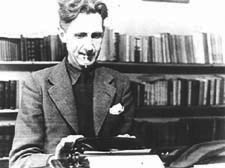|
|
 |
| |
The moguls who gave Orwell his own voice
When George Orwell joined
left-wing journal Tribune it gave him a voice at a crucial time, writes Geoff Goodman
Of all radical and left-wing publications in Britain, daily newspapers, weekly magazines or monthly journals, I doubt if any of them can seriously match the extraordinary 70-year history of the weekly Tribune – which, God knows how, still rattles on.
In all that time it has contained pretty well everything that socialists and most radicals wanted to read, admire, even worship, while of course in the same breath friendly critics would never hesitate to castigate the paper, with careful fury, for failing to match their still higher objectives of a left-wing ‘New Jerusalem’.
At the other end of the political spectrum Tribune tended to be regarded with the derision and odium reserved for what was seen as revolutionary naivete or even worse, downright political teachery.
Yet despite these predictable political reactions most reasoned judges would always salute the journal’s remarkable ability to attract an astonishing range of exceptionally talented writers – most of them paid in buttons.
No writer stands taller in that special salon than George Orwell – who indeed worked for Tribune while he was also writing Animal Farm and Nineteen Eighty Four.
Orwell started writing his regular weekly column in the paper As I Please on December 3 1943 and continued, with a short break through till April 1947.
During the whole of that time he was also busily working on his two masterpieces. That point alone surely establishes the case about the special nature of the Tribune-Orwell relationship.
Yet it is still only part of a remarkable story which this book brings to life as perhaps no other, so far, has been able to do. It is a tribute to the publishers and to Tribune itself that Paul Anderson has been able to edit such a superb compendium of Orwell’s writings at a crucial stage in his life.
A word then about the birth years of this unique weekly agitational journal.
The paper emerged during the critical years of the 1930s – a period when Hitler and Mussolini stalked Europe, when Oswald Mosley’s British Union of Fascists invaded the streets of London and other major British cities with racialist incitement and when Orwell went off to Spain to fight with the International Brigade against Franco.
It was also the period when Neville Chamberlain had taken over from Stanley Baldwin as Prime Minister, and the Labour Party and trade unions were divided and confused about how to tackle the growing crisis of poverty and unemployment at home and fascism across the channel.
That is when Tribune was born – January 1 1937. It was financed by two Labour MPs – the Christian socialist Sir Stafford Cripps, probably the country’s most renowned (and wealthiest) radical barrister who was effectively leader of the Labour left and MP for Bristol, and George Strauss, a wealthy businessman who was Labour MP for Lambeth.
Together they provided £18,000 (nearly a £1 million in current money) as a launch fund for Tribune along with an additional annual subsidy of £5,000 from Cripps.
Around them were the names of virtually all the most prominent socialists of the time – Aneurin Bevan (who became editor of Tribune and a close friend of Orwell) and his wife Jennie Lee, Victor Gollancz, Harold Laski, a young Michael Foot, Raymond Postgate etc.
It was this band of left-wing intellectuals that attracted George Orwell on his return from the Spanish Civil war.
He began writing articles for the paper in 1939 on the outbreak of World War II but didn’t begin his regular column until 1943 by which time Nye Bevan had made him literary editor of Tribune.
An inspired appointment for which Orwell was given the then majestic salary of £500 a year – effectively paid for by Cripps.
Orwell always fought for the opportunity to write as he chose which is why he was never at ease working for the BBC before he joined Tribune where Nye Bevan encouraged him to write with complete independence by providing him a platform – his As I Please column.
It would be invidious and even misleading to snatch, at random, an example from the 80 columns that Orwell wrote before his last in April 1947 when he left Tribune, less than three years before he died, to concentrate on his historic novels.
The Orwell columns covered everything – music, literature, poetry, wartime behaviour, social mannerisms, the weather, the absurdity of the press (especially its ownership) – indeed the entire human comedy (as Balzac might have suggested) and, of course politics.
If I have to select one – just for the hell of it – then I will, querulously, pick No 78 published on March 21 1947. Why? Because I sense that he was already well into his remarkable Nineteen Eighty Four by then and I can sense a foretaste of what is to come in Column No 78. I will say no more; just read it – and, of course, the rest as well.
|
 |
 |
|
 |
|


